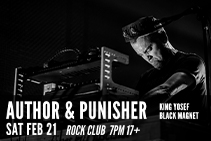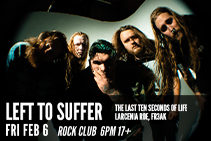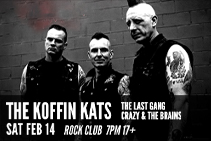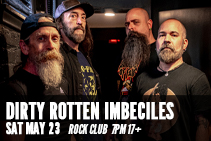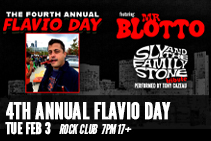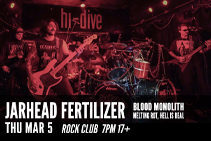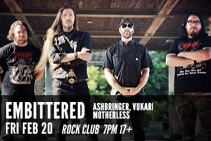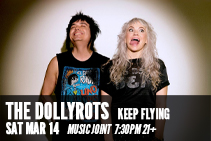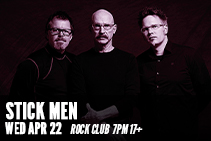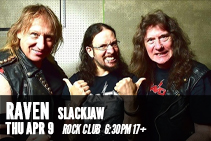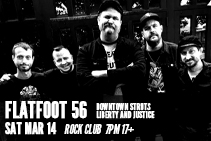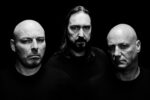
CORONER
Coroner – the artisans of thrash metal
Playful, yet full of raw power; delicate and brutal at the same time; driving rhythms coupled with dizzying guitar solos … Coroner is all this and more. Is it thrash metal? Is it speed metal? Is it technical death metal? This Swiss band cannot be pigeonholed. It is unique … even after 30 years on the go.
The early 1980s was a tumultuous time in Zurich. This usually oh-so-quiet city on the River Limmat was seething with unrest. It was a time of protest marches and riots. Young people were fighting for the freedom and space to express themselves. The atmosphere was highly charged. It was against this backdrop that two bands emerged from the small Zurich metal scene determined to conquer the world: Coroner and Celtic Frost. They were hungry for new, fresh, original music, and decided to make it themselves.
Back then, the Coroner line-up was Tommy Vetterli aka Tommy T. Baron (guitar), Marky Edelmann aka Marquis Marky (drums), and Ron Broder aka Ron Royce (bass). The vocals on the band’s first demo tape (Death Cult) were provided by Tom G. Warrior of Celtic Frost. This was before Ron became the band’s vocalist.
Death Cult got Coroner a record deal with the German label Noise Records, which was at the time a force to be reckoned with when it came to discovering exciting new metal bands. The five studio albums Coroner made with Noise Records proved that it was so much more than a run-of-the-mill thrash metal band: R.I.P (1987) was unpolished high-speed metal, Punishment for Decadence (1988) was musically complex, No More Color (1989) and Mental Vortex (1991) demonstrated the band’s technically maturity, while Grin (1993) marked a shift towards a more straightforward sound with drive. Coroner also proved their mettle on stage with tours of Europe and the USA.
Coroner’s brand of metal is all about complex rhythms and intricate melodies coupled with outstanding technique. The band’s music is driven by Ron’s accurate bass sequences, which push his instrument to the limit of what is possible, and Marky’s drum patterns, that just cannot stick to the straight-and-narrow of four-four time. All of this underpins Tommy’s virtuoso guitar sequences, razor-sharp masterpieces with a neoclassical touch that earned him a reputation as one of the world’s best metal guitarists.
But this uniqueness was also a liability: the band was often underrated; most metal fans had no time for the artistic complexity of Coroner’s music. Tension arose between the band members. Their perfectionism and the resurgence of a desire to explore other musical styles drove the three men apart.
Coroner split after one last tour in 1996. They may not have performed with each other for 15 years, but they certainly were not inactive. Tommy Vetterli toured with Swiss pop star Stephan Eicher and
became a member of the German metal band Kreator. Marky joined Tom G. Warrior’s project Apollyon Sun and experimented with electronic music. Ron withdrew from the metal scene, occasionally playing bass in a variety of projects.
But the fans never forgot Coroner. In fact, the demand from concert organisers for Coroner to perform live again was so great in 2010 that it seemed the time was ripe for a reunion. Coroner went back into the rehearsal room and practiced their old songs with new vigour. What followed was a triumphant tour of the largest metal festivals on the planet: 30,000 people saw Coroner perform live at Hellfest in Clisson (France); Coroner also played Wacken in northern Germany, the Maryland Death Fest in Baltimore (USA), and Bloodstock Openair in England. To top it all, they even went on a musical cruise with 70,000 Tons of Metal. But it didn’t end there: they also played sell-out headliner shows in clubs right across Europe.
The trio was invigorated by its success. After three years and dozens of reunion concerts, Tommy Vetterli and Ron Broder were hungry: they wanted to write new songs and record a new album, 20 years after Grin. But Marky Edelmann was not on board. As far as he was concerned, his personal history with Coroner had come to a dignified end. After a farewell concert in Zurich, Marky left the band in February 2014 and was replaced by Diego Rapacchietti, drummer with 69 Chambers.
Autopsy and a new album: a legacy and a new beginning 2016 is the year of Coroner’s first release of the twenty-first century: Autopsy is a gift to fans packed with gems like a documentary on the history of the band, live footage from the reunion concerts, unpublished and rare archive material, as well as a best-of compilation. It is available as either a limited collector’s edition with 3 blu-ray discs and the compilation on vinyl with a signed gatefold cover or as a standard edition with three DVDs and a compilation CD.
In the spirit of an autopsy, the 100-minute documentary ‘Coroner – Rewind’ dissects the history of the band from 1985 to 2014. It begins with the early days of ‘Heavy Disco’ in the Zurich hinterland and covers everything that followed: the style-defining years at Noise Records, the band’s split, the reunion tour, and Marky Edelmann’s departure.
The documentary features previously unpublished archive material from the 80s and 90s: footage of the studio session where Celtic Frost singer Tom Warrior sang vocals for Coroner’s first demo, backstage footage from the reunion tour, and interviews with the band members, crew, fellow musicians, and contemporaries, including Tom G. Warrior and Martin Ain (Celtic Frost), Mille Petrozza (Kreator), Franz Treichler (Young Gods), Max Cavalera (Sepultura / Soulfly), Chrigel Glanzmann (Eluveitie), Stephan Eicher, Mikael Åkerfeldt (Opeth), and Chris von Rohr (Krokus).
All of them have one thing in common: they admire Coroner’s talent. Or, as Mikael Åkerfeldt of Opeth, puts it in the film: ‘Coroner taught me that playing hard and fast music doesn’t necessarily make you a crap musician. They showed me that it can be art at a very high level.’ For guitarist Tommy Vetterli, ‘Coroner – Rewind’ dug up some old memories: ‘For us, it’s like leafing through a family photo album: you relive all those moments, those highs and lows, all over again.’
The second Autopsy disc provides a cross-section of the reunion concerts from 2011 to 2014: live footage of 17 songs performed at Hellfest, the Maryland Death Fest, Bloodstock Openair, and other festivals and clubs. Autopsy also includes a number of treats in the form of videos of Coroner singles, a recording of the legendary ‘Thrashing East’ concert in East Berlin in 1990, rehearsal footage, and a snippet from Coroner’s very first concert in Zurich.
The future begins now: the new Coroner line-up with drummer Diego Rapacchietti has a record deal with Sony Music Switzerland and will release a new studio album in co-operation with Century Media in 2017. ‘In the 20 years since our farewell tour, we have matured musically,’ says Tommy Vetterli. ‘We now want to show what we can take from this experience in the form of new songs and new energy. We’re back. We really want this. And we’re ready for it.’
The results of the autopsy are in: Coroner is not dead. Coroner is very much alive.


